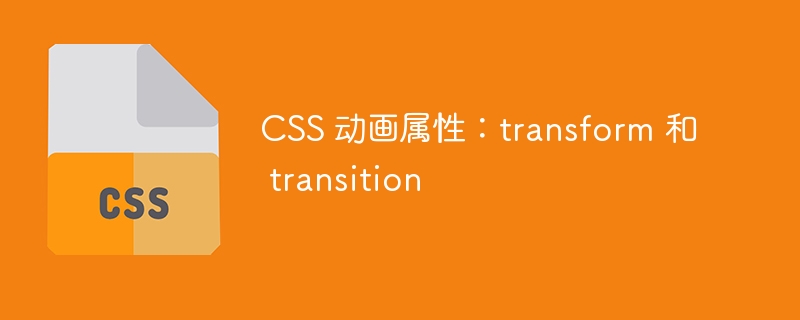CSS animation properties: transform and transition

CSS animation properties: transform and transition
In modern web design, animation effects have become an indispensable element that can add vitality and attraction to the page. force. CSS provides some properties and functions to achieve various animation effects, the two most commonly used properties are transform and transition. This article will introduce these two properties in detail and provide specific code examples to help readers better understand and use them.
- transform attribute
The transform attribute is used to transform or rotate elements. Through the transform attribute, effects such as translation, scaling, rotation, and tilt can be achieved. It has the following commonly used values:
Translation: translate(x, y)
Sample code:
transform: translate(100px, 50px);
Scale: scale(x, y)
Sample code:
transform: scale(1.5, 1.5);
Rotation: rotate(angle)
Sample code:
transform: rotate(45deg);
Tilt: skew(x-angle, y-angle)
Sample code:
transform: skew(10deg, 0);
- transition attribute
The transition attribute is used to add a transition effect to an element to make it transition smoothly when the style changes. Through the transition attribute, you can set the transition time, transition type, transition delay, etc. of the element. It has the following commonly used values:
Transition time: transition-duration
Sample code:
transition-duration: 1s;
Transition type: transition-timing-function
Sample code:
transition-timing-function: ease-in-out;
Transition delay: transition-delay
Sample code:
transition-delay: 0.5s;
The above is the basic usage of the transform and transition attributes. They can be applied to elements alone or combined to create more complex ones. animation effects. Here is a complete code example that shows how to use these two properties to create a simple animation effect:
HTML code:
<!DOCTYPE html>
<html>
<head>
<style>
.box {
width: 100px;
height: 100px;
background-color: red;
transition: transform 1s ease-in-out;
}
.box:hover {
transform: rotate(180deg);
}
</style>
</head>
<body>
<div class="box"></div>
</body>
</html>With the above code, when the mouse is hovering over the red square When it is up, it will rotate 180 degrees clockwise, and the transition time is 1 second, and the transition effect is ease-in-out (first slow, then fast, then slow).
To sum up, the transform and transition properties are important tools for achieving animation effects. By flexibly using these attributes, we can add vivid and interesting animation effects to the page, thereby improving user experience and page quality. Hopefully the code examples and explanations provided in this article will help readers better understand how to use these two properties.
The above is the detailed content of CSS animation properties: transform and transition. For more information, please follow other related articles on the PHP Chinese website!

Hot AI Tools

Undresser.AI Undress
AI-powered app for creating realistic nude photos

AI Clothes Remover
Online AI tool for removing clothes from photos.

Undress AI Tool
Undress images for free

Clothoff.io
AI clothes remover

AI Hentai Generator
Generate AI Hentai for free.

Hot Article

Hot Tools

Notepad++7.3.1
Easy-to-use and free code editor

SublimeText3 Chinese version
Chinese version, very easy to use

Zend Studio 13.0.1
Powerful PHP integrated development environment

Dreamweaver CS6
Visual web development tools

SublimeText3 Mac version
God-level code editing software (SublimeText3)

Hot Topics
 1385
1385
 52
52
 How to use bootstrap in vue
Apr 07, 2025 pm 11:33 PM
How to use bootstrap in vue
Apr 07, 2025 pm 11:33 PM
Using Bootstrap in Vue.js is divided into five steps: Install Bootstrap. Import Bootstrap in main.js. Use the Bootstrap component directly in the template. Optional: Custom style. Optional: Use plug-ins.
 The Roles of HTML, CSS, and JavaScript: Core Responsibilities
Apr 08, 2025 pm 07:05 PM
The Roles of HTML, CSS, and JavaScript: Core Responsibilities
Apr 08, 2025 pm 07:05 PM
HTML defines the web structure, CSS is responsible for style and layout, and JavaScript gives dynamic interaction. The three perform their duties in web development and jointly build a colorful website.
 How to write split lines on bootstrap
Apr 07, 2025 pm 03:12 PM
How to write split lines on bootstrap
Apr 07, 2025 pm 03:12 PM
There are two ways to create a Bootstrap split line: using the tag, which creates a horizontal split line. Use the CSS border property to create custom style split lines.
 Understanding HTML, CSS, and JavaScript: A Beginner's Guide
Apr 12, 2025 am 12:02 AM
Understanding HTML, CSS, and JavaScript: A Beginner's Guide
Apr 12, 2025 am 12:02 AM
WebdevelopmentreliesonHTML,CSS,andJavaScript:1)HTMLstructurescontent,2)CSSstylesit,and3)JavaScriptaddsinteractivity,formingthebasisofmodernwebexperiences.
 How to resize bootstrap
Apr 07, 2025 pm 03:18 PM
How to resize bootstrap
Apr 07, 2025 pm 03:18 PM
To adjust the size of elements in Bootstrap, you can use the dimension class, which includes: adjusting width: .col-, .w-, .mw-adjust height: .h-, .min-h-, .max-h-
 How to set up the framework for bootstrap
Apr 07, 2025 pm 03:27 PM
How to set up the framework for bootstrap
Apr 07, 2025 pm 03:27 PM
To set up the Bootstrap framework, you need to follow these steps: 1. Reference the Bootstrap file via CDN; 2. Download and host the file on your own server; 3. Include the Bootstrap file in HTML; 4. Compile Sass/Less as needed; 5. Import a custom file (optional). Once setup is complete, you can use Bootstrap's grid systems, components, and styles to create responsive websites and applications.
 How to insert pictures on bootstrap
Apr 07, 2025 pm 03:30 PM
How to insert pictures on bootstrap
Apr 07, 2025 pm 03:30 PM
There are several ways to insert images in Bootstrap: insert images directly, using the HTML img tag. With the Bootstrap image component, you can provide responsive images and more styles. Set the image size, use the img-fluid class to make the image adaptable. Set the border, using the img-bordered class. Set the rounded corners and use the img-rounded class. Set the shadow, use the shadow class. Resize and position the image, using CSS style. Using the background image, use the background-image CSS property.
 How to use bootstrap button
Apr 07, 2025 pm 03:09 PM
How to use bootstrap button
Apr 07, 2025 pm 03:09 PM
How to use the Bootstrap button? Introduce Bootstrap CSS to create button elements and add Bootstrap button class to add button text




